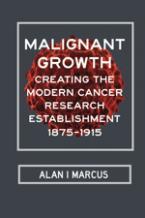Malignant Growth. Creating the Modern Cancer Research Establishment, 1875-1915
HISTORY / MEDICINE AND TECHNOLOGY / BIOLOGYMalignant GrowthCreating the Modern Cancer Research Establishment, 1875–1915Alan I Marcus
An examination of the first attempt to conquer cancer in the late nineteenth and early twentieth centuries
In Malignant Growth: Creating the Modern Cancer Research Establishment, 1875–1915, Alan I Marcus explores a relatively understudied period in the history of cancer by providing a careful investigation of the first public crusade to determine the cause of cancer. Searching for cancer’s cause occurred during the heady era of bacteriology and its Germ Theory of Disease. Researchers demonstrated in malady after malady that each disease was the result of a singular and specific pathogenic agent. That model led investigators optimisticly to conclude that they would soon find the cause of what was termed the “emperor of all maladies,” cases of which were apparently increasing at a prodigious rate worldwide.
In this accessible history of science and medicine, Marcus exposes the complex story of the efforts made from 1875 through 1915 to first conquer and failing that, to control cancer. That dual approach remains in force to this day. He reveals the messiness of real-time scientific research, tracing the repeated lurches of promise, discoveries of hope, and the inevitable despair that always followed. Other barriers existed to the research, such as inconsistency in test standards and interlaboratory competition and mistrust. Researchers approached cancer from such disparate specialties as clinical medicine, zoology, botany, chemistry, nutrition, bacteriology, pathology, and microbiology. Although they came from diverse fields, each steadfastly maintained that cancer operated in an analogous fashion to other bacteriological era diseases.
Virtually every country and a slew of different people conducted this war on cancer. They operated in remarkably diverse scientific venues and created institution after institution in country after country. Cancer laboratories and hospitals as well as organizations like the American Cancer Society were born out of this first offensive on cancer. Even as cancer continues to explode, these institutions that initially formed to defeat cancer more than a hundred years ago persist to the present day.
Alan I Marcus is the William L. Giles Distinguished Professor of History at Mississippi State University. He is the Head of the history department there and served also while writing this book as interim chair of the chemistry department. He is the author of Cancer from Beef: DES, Federal Food Regulation, and Consumer Confidence and the author or editor of some 20 other volumes.
APRIL6 x 9 / 368 PAGESISBN 978-0-8173-1979-3 / $59.95s CLOTHISBN 978-0-8173-9177-5 / $59.95s EBOOK
“Malignant Growth explores a relatively understudied period in the history of cancer: the beginnings of laboratory research and the effort by new cancer laboratories to promote, from the 1900s to the 1910s, a ‘war against cancer’ to attract public support for their work. An account of this ‘war’ has long been needed, but what makes this one so valuable is the author’s argument that it was built on faulty foundation—an analogy between cancer and infectious disease.”—David Cantor, editor of Cancer in the Twentieth Century
